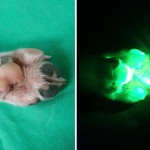Tegon is her name and glowing is her game. Tegon is not the only animal that has been genetically modified to glow; she joins a red fluorescent puppy named Ruppy and Mr. Green Genes the cat. Tegon is a beagle and was created by Byeong Chun Lee, the director of the Seoul National University Hospital for Animals in Korea, and his colleagues in 2009. Lee told Discovery news, “The entire body of the dog glows. One can witness a slightly yellower change in the color of the dog’s skin, but to the naked eye, fluorescence cannot be seen without the presence of UV light and goggles.”
There was a five step process that had to happen in order to produce Tegon. The first step was to insert a piece of DNA that controls the way a green fluorescent gene is expressed into dog cells. After modifying the dog cells they injected them into the DNA of an immature female reproductive cell before it’s fertilization. Step three consisted of producing an embryo using a technique called Somatic Cell Nuclear Transfer. This embryo was implanted into a mother beagle. Tegon was born 60 days later with the ability to glow under UV light when given a certain antibiotic called doxycycline. The study started in 2009, but the details of the study was just released last month. Now Tegon is grown and with pups of her own. It hasn’t been made clear whether her pups inherited her glowing talents.
Lee’s team and many other teams such as his are certain that these studies will dramatically impact the studies of human diseases. Genetically, dogs have similar aspects to humans and Lee states that we could better understand how the Alzheimer’s and Parkinson’s diseases develop by simply substituting the glow genes with the genes that cause these diseases.
Compared to lab rats there is a little more cooperation from dogs, which makes them ideal for this type of research and apparently dogs have been used for various other research studies in the past. As you can imagine there have always been a lot of controversy involving genetically modifying cats, dogs and other animals from various animal activists groups, but the research still goes on.
For Further Reading:
discovery.com
blogs.orlandosentinel.com
csmonitor.com


